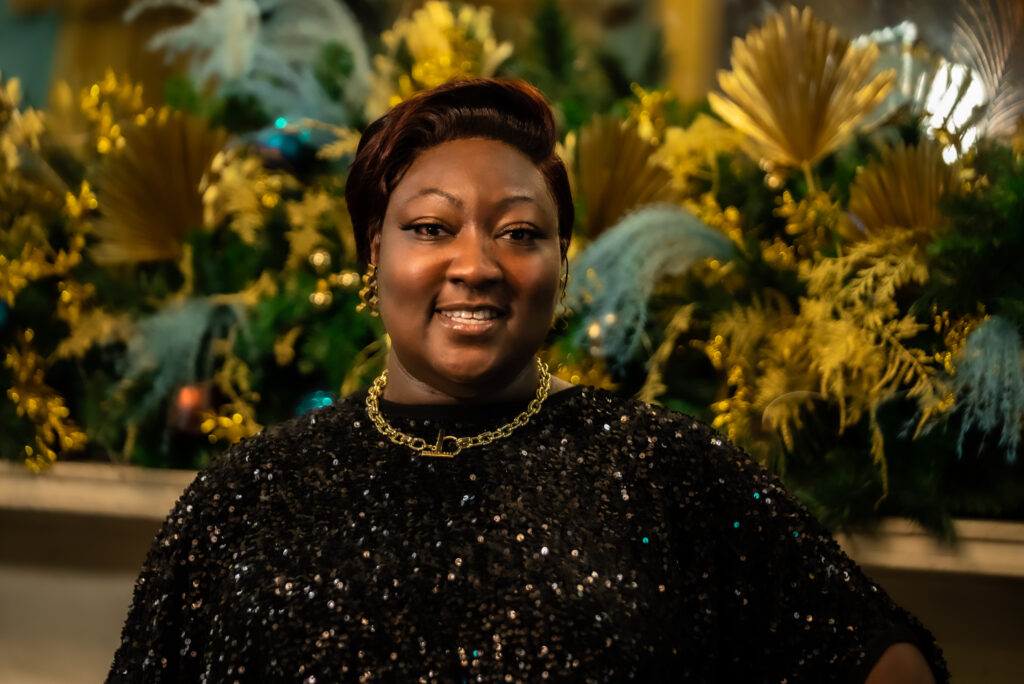Phyll Opoku-Gyimah, Founder of UK Black Pride, Creates Safe, Inclusive Space for Queer People of Color
Phyll Opoku-Gyimah, also known as Lady Phyll, touts that she’s a Ghanaian warrior woman, who was “born in London but made in Africa.” She’s the founder of UK Black Pride, and although she comes across as a very focused queer woman, Opoku-Gyimah’s transformation to a confident Queen B was forged from what remains a difficult subject to talk about – coming out to her family.
Even after more than 20 years of LGBTQ+ activism, she still struggles with her family, much like Black American families, who are tethered to the church of thought, which includes a heavy dose of prayer and reading their bible. Lady Phyll – a woman who loves women – uses her traumatic coming-out experience to help guide others. So, it’s not surprising that she’s used her personal coming-out experience to fuel her passion to fight for the equal rights of all people, specifically lesbian, trans, and queer people of color, who are often not seen or represented in the larger LGBTQ+ community.
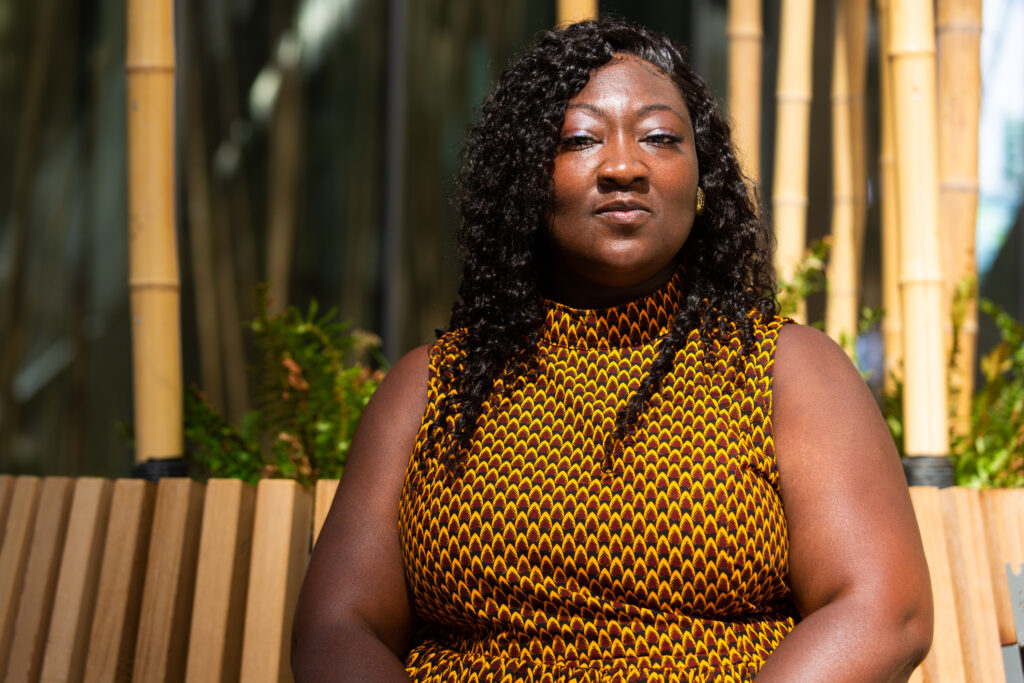
“I want people to know that they are valued, and they’re seen regardless of that journey,” said Opoku-Gyimah, explaining the importance of a support system. “If you are going to come out, please just make sure you have your chosen family, your tribe, and your support network so you don’t feel in an isolating or what could be a soul-destroying situation like I may have felt when I came out.”
I wanted to chat with Lady Phyll about the genesis of UK Black Pride as well as what attendees can expect for the annual event coming up on Sunday, August 14th, at the Queen Elizabeth Olympic Park in London. During our conversation, we chat about her recent tour of Pride celebrations and her fight for LGBTQ+ rights, while creating a safe space for queer people of color.
Vacationer: This is the 17th year of celebrating UK Black Pride. Can you tell us what sparked your passion to start this event and to be an LGBTQ+ activist?
Phyll Opoku-Gyimah: I was running BLUK (Black Lesbians in the UK). It was just an online voluntary organization that brought women, transwomen, and bi-women together online. I took it offline, and we went to a place called Southend to just be in a space that felt safe for us. It reminded me of the Prides in Washington, DC, Atlanta, and Chicago. I said, “We’re going to have a Black Pride in this country.” And I guess that’s where it all kicked off.
I want people to understand that UK Black Pride was born out of, of course understanding the struggles, the nuances, and the complexities of our very diverse community, but through Black women and women of color who often do not get seen in various aspects of the wider spectrum.
I know that whilst this country displays harm violence and fear towards LGBTQ+ persons and Black people; we understood that the time for waiting was over. Let’s get out there, let’s have ourselves seen and be visible 365 days of the year, and let’s make sure that whilst we know we’re not being seen in wider mainstream Pride or LGBT activities we create something that’s for us and by us.
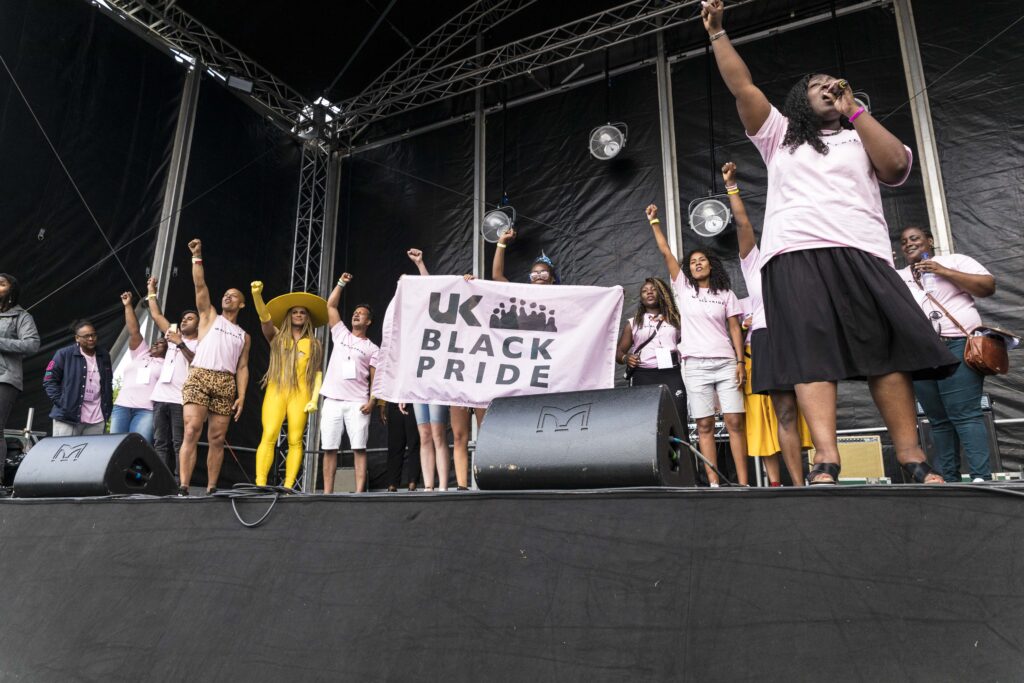
So, what special plans do you have going on this year? Is this the first time you’ve had the event post-COVID?
So, we had it last year, but it was online. This will be the very first time since 2019 that we’re having an in-person event. I am so excited because the theme is “Power,” and I guess power can mean different things to different people, but this is about our collective power, where we find strength in each other – we are powerful together. It’s not about the hierarchal nature of power and privilege, but our power as Black and queer people of color (QPOC).
This year is so exciting because we’ve secured our home at the Queen Elizabeth Olympic Park, which turns 10 years old this year. When you enter UK Black Pride, you are going to be greeted with what feels like so many chosen family members – people that you’ve not even met.
There’s a community and village area, a safe sober space, a well-being stage for workshops, poets, and artists; a deejay tent that has an array of music from our Arabic community to our Latinx community to Bollywood and Asian, and East Asian fusion to R&B, Hip-Hop, and Afro beats.
And then on the main stage, we had more than 300 applications from people who wanted to perform. And what we do is we platform our LGBTQ+ Black and POC that don’t ordinarily get a platform or a stage to showcase their talents. And of course, our headliner Beyonce experience, and our speakers and sponsors who do not center themselves in our Pride but understand that they are a guest in our house, will also be there taking part in real allyship to the movement.
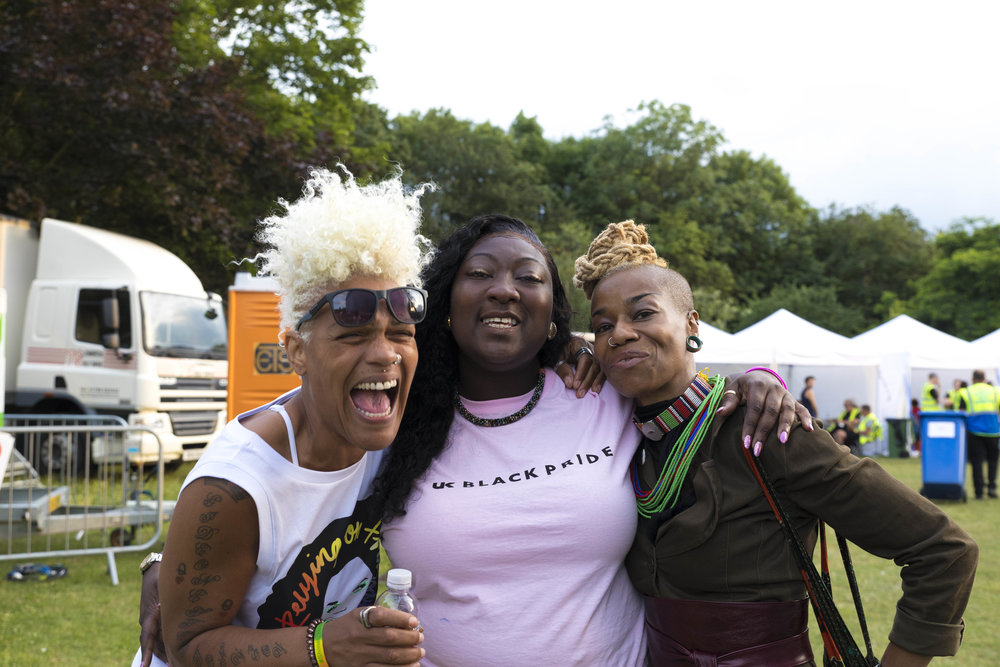
I’ve noticed that although the event in the name says Black Pride it seems pretty ethnically diverse. Was that a conscious decision to be inclusive?
Just giving it some context and clarity over the inclusion of different minorities and even the understanding of Black. When we saw in the 70s and 80s in the UK that Black people faced really horrendous violence and racism across society. We know that held so much trauma for us. But it brought about many movements that Black people and people of color understood what was “political blackness.” So, UK Black Pride talks about our African, Asian, Caribbean, Latin, American, and Middle Eastern people – those of the diaspora to really come forward.
And then at the same time, we have always used this practice or lens of being intersectional even before the language was there. We made sure that when we’re talking about race, we’re talking about gender, race, class, poverty, socioeconomic status, migrants, asylum seekers, and refugees. We’re talking about those who are low-wage, homeless and those who meet at the intersection of the many different things that cause those barriers to oppression due to systematic and structural failures.
So, I would say, and I echo what people say about UK Black Pride – we are the most diverse Pride in all of Europe. We’re not the largest, but we are the most diverse because of the many different intersections that you’ll find, see, and meet at the annual event.
I’ve seen posts of you traveling in the U.S. to different Pride events and celebrations. Were they primarily Black Pride events or a mixture of celebrations? Do you normally do a Pride tour in the summer?
I’ve been part of the Pride movement for the last 18 years and I think it’s really important that you visit, see, support, and show solidarity to other Prides and other Prides that may not have the same structure as the larger mainstream ones – whether it’s Bi-Pride, Trans-Pride, Norwich Pride, or Ipswich Pride. This year, I’ve been fortunate enough to be at the Washington DC Black Pride, Atlanta, New York Pride, New York Black Pride, and Toronto Pride, a mainstream Pride event where I was the Grand Marshal. I’ll be going to Sydney WorldPride next year.
I think there’s something about synergizing and connecting. I always talk about these shared commonalities, but I also learn from other Prides. What can be infused or woven into the beauty of UK Black Pride? And also in turn, because I believe UK Black Pride has a lot to offer other Pride events. I can impart the knowledge that I’ve gained over these many years about what a good Pride looks like, especially when it comes to including indigenous folk.
Let’s take Canada for example, they say 2SLGBT+ people and that “2S” is two-spirits and the acknowledgment of the lands on which they sit and stand. Oftentimes our indigenous folk feel very, very marginalized. The issues that impact them are not always seen through our Pride. So, if that’s the case, how do we be better and do better? That’s why I love touring around, not just because it’s great to celebrate, but for me, it’s a great learning and unlearning opportunity.
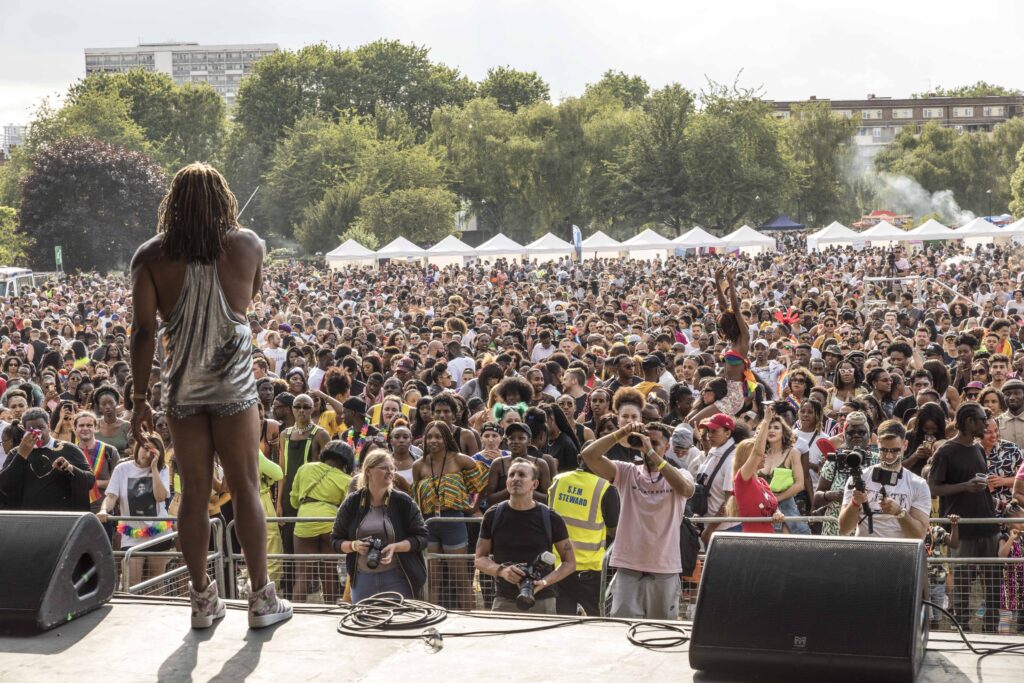
Do you think people see you and UK Black Pride as a beacon for them to come out and be their authentic selves?
It’s like when people say to me, “Oh, you’re such a role model.” I sometimes squirm because I think that we all do some modeling within our roles. After all, we want others to feel like this is a place and space for them. Yes, I have now accepted it. This is a leadership role and I hold some power and some privilege – and I say this lightly so that my white siblings don’t start telling me, “See you’ve got privilege, you’ve got privilege.”
But I understand that having this voice and agency means that I can change things because the rooms and the spaces I’ve been in afforded entry into or that I’ve booted down. I take it seriously because young people, the next generation, they’re watching, and some of them are struggling and some of them are thinking, “If she can do it as a Black African woman against all the odds, against all the hate that she’s faced, and death threats; then surely there’s hope out there.” I guess it’s the hope that I want people to feel because the moment you lose hope there is no way forward.
Let me be clear that I have an amazing team that drives UK Black Pride forward. They are also seeing what leadership looks like in so many different ways. And people approach us all because they want to be part of this.
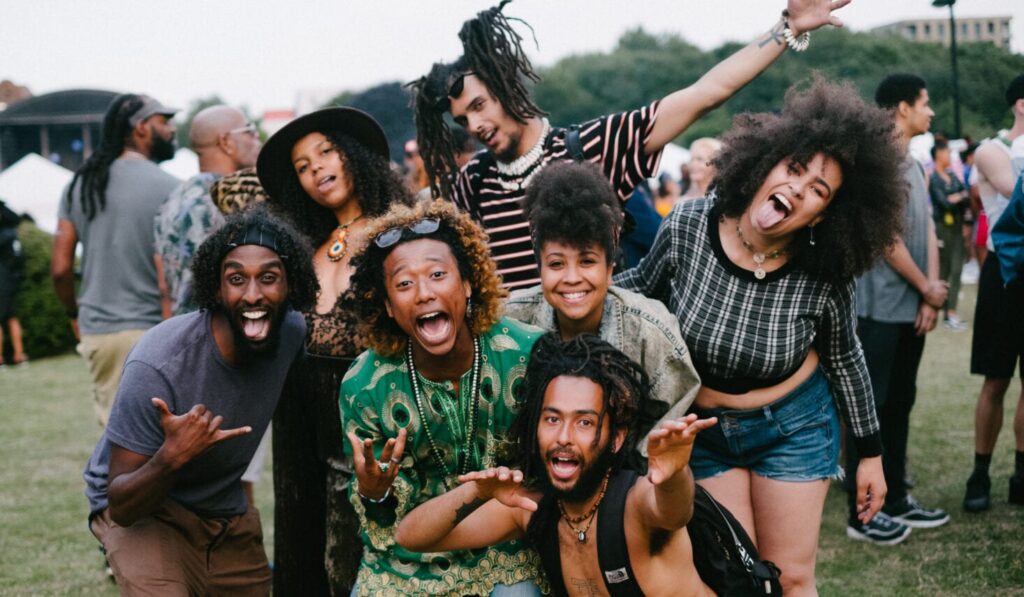
You have been a major changemaker for the Black queer community. If there’s one thing you’d want as your legacy or for people to remember you for, what would it be?
That I’m fierce! No. And that I am an unapologetically Black lesbian African, and I always stood by my principles and made sure that it was always about the people and not about profits.
I have a legacy already. I have a daughter who is 27 although I only look like I’m 21.
I have a wonderful map on my tummy to show that I am. Yeah, she (her daughter) is somebody that when she went to university, she joined every society that she could, and she stood up for LGBT people on her campus and was rallying around and talking about UK Black Pride.
I was like, “You know you can tell me anything. My darling, if you are queer, I’m here for you.” She said, “No, mom, I’m strictly dickly. I just want you to know that I am supportive because you’ve told me that an injury to one is an injury to all. So, how can I not stand up for underrepresented people.” So, that’s my legacy.

